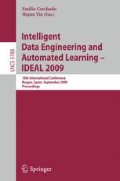Abstract
Classification is a machine learning technique whose objective is the prediction of the class membership of data instances. There are numerous models currently available for performing classification, among which decision trees and artificial neural networks. In this article we describe the implementation of a new lazy classification model called similarity classifier. Given an out-of-sample instance, this model predicts its class by finding the training instances that are similar to it, and returning the most frequent class among these instances. The classifier was implemented using Weka’s data mining API, and is available for download. Its performance, according to accuracy and speed metrics, compares relatively well with that of well-established classifiers such as nearest neighbor models or support vector machines. For this reason, the similarity classifier can become a useful instrument in a data mining practitioner’s tool set.
Access this chapter
Tax calculation will be finalised at checkout
Purchases are for personal use only
Preview
Unable to display preview. Download preview PDF.
References
Rhodes, D.R., Yu, J., Shanker, K., Deshpande, N., Varambally, R., Ghosh, D., Barrette, T., Pandey, A., Chinnaiyan, A.M.: ONCOMINE: A Cancer Microarray Database and Integrated Data-Mining Platform. Neoplasia 6(1), 1–6 (2004)
Pantel, P., Lin, D.: SpamCop: A Spam Classification & Organization Program. In: Learning for Text Categorization: Papers from the 1998 Workshop, pp. 95–98 (1998)
John, G.H., Langley, P.: Estimating Continuous Distributions in Bayesian Classifiers. In: 11th Conference on Uncertainty in Artificial Intelligence, pp. 338–345. Morgan Kaufmann, San Francisco (1995)
Aha, D.W., Kibler, D., Albert, M.K.: Instance-Based Learning Algorithms. Machine Learning 6(1), 37–66 (1991)
Cleary, J.G., Trigg, L.E.: K*: An Instance-Based Learner Using an Entropic Distance Measure. In: 12th International Conference on Machine Learning, pp. 108–114. Morgan Kaufmann, San Francisco (1995)
Fayyad, U.M., Irani, K.B.: Multi-Interval Discretization of Continuous-Valued Attributes for Classification Learning. In: 13th International Joint Conference on Artificial Intelligence, pp. 1022–1027. Morgan Kaufmann, San Francisco (1993)
Witten, I., Frank, E.: Data Mining: Practical Machine Learning Tools and Techniques, 2nd edn. Morgan Kaufmann, San Francisco (2005)
UCI Machine Learning Repository, http://www.ics.uci.edu/~mlearn/MLRepository.html
Author information
Authors and Affiliations
Editor information
Editors and Affiliations
Rights and permissions
Copyright information
© 2009 Springer-Verlag Berlin Heidelberg
About this paper
Cite this paper
Barbosa, R.P., Belo, O. (2009). Lazy Classification Using an Optimized Instance-Based Learner. In: Corchado, E., Yin, H. (eds) Intelligent Data Engineering and Automated Learning - IDEAL 2009. IDEAL 2009. Lecture Notes in Computer Science, vol 5788. Springer, Berlin, Heidelberg. https://doi.org/10.1007/978-3-642-04394-9_9
Download citation
DOI: https://doi.org/10.1007/978-3-642-04394-9_9
Publisher Name: Springer, Berlin, Heidelberg
Print ISBN: 978-3-642-04393-2
Online ISBN: 978-3-642-04394-9
eBook Packages: Computer ScienceComputer Science (R0)

